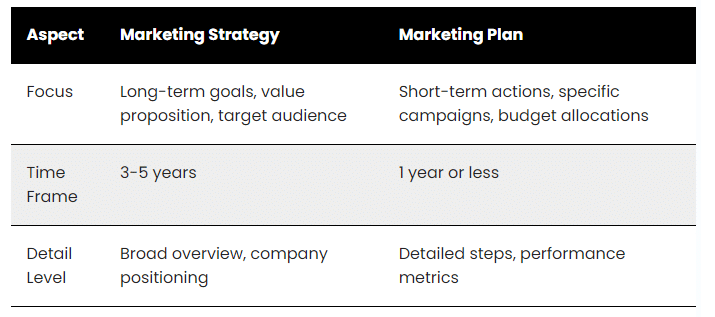
By Glen Williams
Introduction to Marketing Concepts
In today’s competitive business landscape, understanding the difference between a marketing strategy and a marketing plan is vital for success. While they are often used interchangeably, these concepts serve distinct roles in guiding a company’s efforts. A well-defined strategy provides a roadmap to achieve long-term goals, whereas a marketing plan focuses on the specific actions needed to turn those strategies into reality.
“A business without a strategy and plan is like a ship without a compass.”
Grasping these concepts is crucial for driving growth and achieving business objectives.
What is a Marketing Strategy?
Definition
A marketing strategy is a comprehensive plan designed to attract and convert prospective consumers into loyal customers. It encompasses the company’s value proposition, core messaging, and insights into target demographics, aiming for a sustainable competitive advantage. By understanding customer needs and effectively communicating core values, businesses can set themselves apart from competitors.
“A well-defined marketing strategy is key to achieving a sustainable competitive advantage.”
Long-Term Focus
A marketing strategy focuses on long-term goals, using online tools and channels to promote products or services effectively. This approach is data-driven, fostering brand loyalty and continuous improvement over time. By leveraging real-time data, businesses can optimize their strategies to align with evolving market conditions and customer preferences.
Examples
Targeting specific demographics is a common strategy. For instance, Stanley Cup Company expanded its audience to women and children, while LEGO introduced complex sets for adults. These examples demonstrate how demographic segmentation can effectively resonate with different consumer groups, ensuring long-term business success.

What is a Marketing Plan?
Definition
A marketing plan is an operational document that details the advertising strategy an organization will implement. It aims to generate leads and reach the target market, focusing on outreach and public relations campaigns. This plan encompasses everything from the duration of campaigns to the methods of measuring their effectiveness. Notably, a marketing plan is a crucial component of a company’s broader business strategy.
“A marketing plan is the roadmap for achieving quick and measurable marketing results.”
Short-Term Focus
Designed for short-term implementation, marketing plans aim for immediate results. They employ tactics like limited-time promotions, flash sales, and contests, creating a sense of urgency. This approach helps boost current revenue and meet short-term sales targets, providing instant gratification for both businesses and customers.
Examples
Examples of effective marketing plans include advertising campaigns and promotional events. Consider the University of Illinois, which uses direct mail campaigns to boost enrollment, or Coca-Cola, which utilizes video marketing to simplify complex concepts. These diverse approaches highlight the importance of understanding your audience and setting clear objectives for successful marketing initiatives.
Key Differences Between Strategy and Plan
When it comes to marketing, understanding the distinction between a marketing strategy and a marketing plan is crucial for success. While both elements are vital, they serve different purposes and operate on varying timelines.

Here are the primary differences to consider:
- Focus: Strategies provide a long-term direction, while plans focus on immediate actions.
- Time Frame: Strategies span several years, whereas plans are typically annual or shorter.
- Components: Strategies include broad objectives and SWOT analysis, while plans break down into actionable steps with specific budgets and timelines.
Ultimately, a well-crafted strategy guides the development of actionable plans, ensuring that both short-term goals and long-term visions are aligned to drive business success.
How Strategy and Plan Work Together
In the dynamic world of marketing, a marketing strategy and a marketing plan are like two sides of the same coin, each playing a crucial role in achieving business success. A marketing strategy is the visionary framework shaped by business goals. It defines the purpose behind marketing efforts, aligning with the company’s mission and addressing the challenges of target audiences. In essence, the strategy provides the ‘why’ of marketing activities.
Conversely, the marketing plan is the tactical execution roadmap that brings the strategy to life. It details the ‘how,’ specifying the actions to be taken, timelines, and success metrics. For instance, strategies like audience segmentation can lead to tailored marketing plans, as seen in Visit Baton Rouge’s persona-targeted journeys.
“A solid marketing strategy acts as the foundation, guiding the creation of effective plans and ensuring alignment with overarching business objectives.”
Ultimately, without a well-defined strategy, plans may lack direction, resulting in disjointed efforts. Together, they form a cohesive approach, ensuring that every marketing activity is purpose-driven and aligned with business goals.
FAQ on Marketing Strategy vs. Plan
Understanding the nuances between a marketing strategy and a marketing plan can be the key to unlocking business success. Here, we address some frequently asked questions to clear up any confusion.
What is the difference between a marketing strategy and marketing plan? A marketing strategy outlines long-term goals and the approach to achieve them, while a marketing plan details the specific actions to implement the strategy.
How does a marketing strategy guide marketing tactics? The strategy provides the ‘why,’ guiding the ‘how’ of marketing tactics. Tactics are the specific actions taken to execute the strategy effectively.
Can small businesses benefit from a marketing plan? Absolutely. Regardless of size, every business can leverage a marketing plan to structure efforts and drive growth.
Why is aligning a marketing strategy with business goals crucial? Alignment ensures that marketing efforts contribute directly to broader objectives like revenue growth and market expansion, optimizing return on investment.
For more insights, visit WorkSprings for essential questions to enhance your marketing plan, and dispel common myths at Creative Bytes.
Conclusion
In conclusion, understanding the key differences between a marketing strategy and a marketing plan is crucial for any business aiming for success. A strong strategy sets the vision and long-term goals, while the plan outlines the specific actions needed to achieve them. Together, they form the backbone of effective marketing efforts. Remember, “Strategy is the map, and the plan is the journey.” Embrace both to navigate your business toward its goals efficiently.

